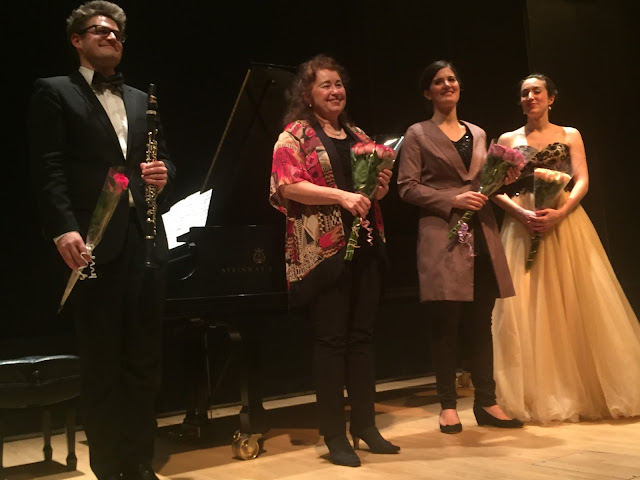 | |||
| Guillaume Vincent and Jeanne Gerard |
Music is always good, but chamber music in an intimate space is the best. We love the Weill Recital Hall where one can get up close and personal with the artists. There was a fine selection of artists Tuesday night sharing the Spanish music of which we are so fond. Coming from several Latin American countries as well as from Spain, they performed to draw attention to the rain forest of the Amazon--so important to the health and welfare of the entire planet.
It was a most generous program and the first thing that struck us about the singers--before we even heard them sing--was how beautiful and stylish Latin American women are. We might as well have been attending a Miss Universe contest! But these women have a great deal more to offer; all of them sang with intense involvement with the material and all connected well with the audience. Bravissima!
Accompanied by Oscar Lobete, Colombian soprano Ana Maria Ruge sang two lovely songs by Colombian composer Roberto Pineda Duque. Ms. Ruge appeared in a stunning diaphonous silver gown that matched the silver in her sound. We loved the romantic "Tu Pupila es Azul" as well as the melancholy "Pobre Amor".
Spanish soprano Laura Sabatel appeared in a stunning orange gown and serenaded us with "El Arbol del Olvido" by Argentinean composer Alberto Ginastera. The dance rhythm seemed to affect our entire body.
Lyric soprano Nardo Muñoz hails from Columbia and lent her ringing tone to "Vivir Sin Tus Caricias" by Cuban composer Eduardo Sánchez and "Algún Día" by Colombian composer Jaime Leónferro.
Looking like Amneris in a gorgeous green gown was Mexican soprano Mónica Ábrego who was joined by some stellar musicians from the Rebow Ensemble for Cuatro Nocturnos by the young Mexican composer Juan Pablo Contreras, a departure from most of the other works on the program which were composed in the early 20th c. Conducted by Ricardo Jaramillo, the combination of flute, clarinet, bassoon, bass and string quartet made for some fine listening and Ms. Abrego has a killer trill.
Slipping into this Latin American lineup was French soprano Jeanne Gérard who, accompanied by Guilllaume Vincent, contributed three wonderful songs. In "Canción del Ruiseñor" from Doña Francisquita by the Spanish composer Amadeo Vives her lovely and agile voice joined with the piano in imitating the song of the nightingale. From El Anillo de Hierro by Spanish composer Pedro Márquez we heard "Lágrimas Mías", a song of suffering. And finally, "Al Amor" from the Catalonian composer Fernando Obradors.
Mezzo-soprano Sarah Nelson Craft sang selections from the familiar cycle Canciones Populares by the Spanish composer Manuel de Falla. We have reviewed these songs several times this month and never tire of them. We were a trifle uneasy that Ms. Craft seemed to ignore the ironic symbolism of "El Paño Moruno" but by the time she got to the sad "Asturiana" and the angry "Polo" we became far more involved. She was accompanied by the superb guitarist Nilko Andreas Guarin.
Mr. Guarin delighted us in Manuel de Falla's Danza de la Vida Breve with cellist Serafim Smigelsky. The duo are equally adept at contemporary music as they performed the world premiere of Reino Incierto by Colombian composer Juan Calderón.
There was yet more instrumental music in this generous program--pianist Hyemin Kim performed Castelnuovo Tedesco's Fantasia for Piano and Guitar Op. 49 with Mr. Guarin matching her pianistic skill on the guitar.
Mr. Guarin appeared once more in Luigi Bocherini's late 18th c. "Introduccion y Fandango" from his Guitar Quintet No. 4 in D. We particularly enjoyed the glissandi on Mr. Smigelsky's cello and Noemi Perez Segura's way with the castanets.
The final piece on the program was Concierto del Sur for Mr. Guarin's guitar and chamber orchestra, conducted by Mr. Jaramillo. We would like to point out that the newly formed Rebow Ensemble, which contributed so much to the success of the evening, continues to put a modern spin on classical music with its diverse collection of musicians. We will be hearing more from them in the future.
Mr. Guarin founded Azlo Productions to increase musical and cultural exchange between Spain, Latin America, and the USA and to unify the Americas through art. We have nothing but good things to say about social action through music.
(c) meche kroop
















